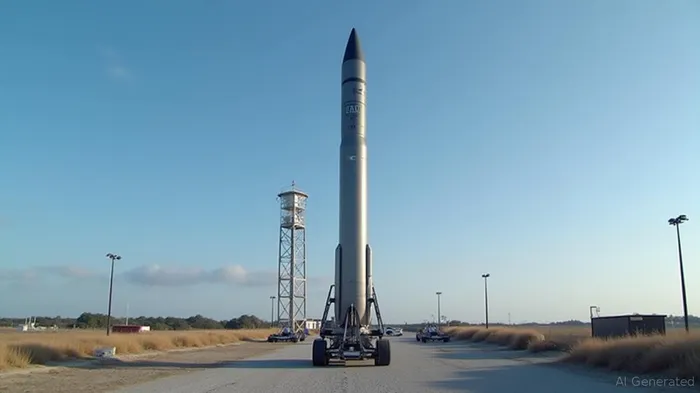Rocket Lab's Launch Cadence and Responsive Capabilities Position It as a Dominant Player in SmallSat Launch Services
Rocket Lab has emerged as a formidable player in the smallsat launch market, leveraging its accelerated launch cadence and operational efficiency to carve out a leadership position. With a proven track record of rapid turnaround times and a 100% mission success rate for its Electron rocketRCKT-- in 2024, the company is now poised to dominate the $1.8 trillion space economy.

The Power of Launch Cadence: Outpacing the Competition
Rocket Lab's Electron rocket has become synonymous with speed and reliability. In 2024, the company executed 16 orbital launches—a 60% increase from 2023—while maintaining a flawless success record. This cadenceCADE-- outperformed rivals like Virgin Orbit, which struggled with operational delays, and Firefly Aerospace, still maturing its Alpha rocket. Rocket Lab's ability to deliver payloads to orbit in as few as nine days between missions has made it the second-most frequently used launch provider in the U.S., trailing only SpaceX.
This cadence isn't just about quantity—quality matters. The Electron's dedicated launch model offers customers precise orbital insertion at a cost of $8.4 million per mission, undercutting SpaceX's Falcon 9 for small payloads. For firms like iQPS, which contracted Rocket LabRKLB-- for an 18-launch SAR satellite constellation, this affordability and agility are game-changers.
Market Share and Financial Momentum
Rocket Lab's $1.05 billion backlog as of 2024 reflects strong demand, with 56% of orders slated for conversion into revenue within the next year. Revenue surged to $436.2 million in 2024, a 78% year-over-year jump, driven by both launches and its Space Systems division (e.g., Photon satellites and laser communication tech).
The company's Space Systems segment now accounts for 72% of gross profit, diversifying its revenue streams beyond launches. This vertical integration positions Rocket Lab to capture value across the entire smallsat lifecycle—from manufacturing to deployment—unlike competitors focused solely on rockets.
The Neutron Rocket: Expanding into Medium-Lift Markets
Rocket Lab's Neutron rocket, capable of carrying up to 13,000 kg to LEO, is its next major growth lever. With a projected launch price of $50–55 million, Neutron aims to compete with SpaceX's Falcon 9 while addressing the medium-lift gap in the market. Initial testing of its Archimedes engine has gone smoothly, and a first flight is targeted for mid-2025.
If Neutron meets expectations, it could unlock lucrative government contracts, such as the $5.6 billion U.S. Space Force NSSL program, and enable Rocket Lab to deploy its own satellite constellations. However, delays or cost overruns could strain its $271 million cash balance and investor confidence.
Risks and Challenges
Rocket Lab's path to dominance isn't without hurdles. Despite its financial growth, the company still reported a $190 million net loss in 2024 due to Neutron's R&D expenses. Analysts project profitability by 2027, but execution risks remain:
- Neutron's timeline: Delays could push costs higher and jeopardize government contracts requiring demonstration by late 2025.
- SpaceX's dominance: While Rocket Lab targets niche markets, SpaceX's 90% U.S. launch share looms large.
- Valuation expectations: Rocket Lab's $4.1 billion valuation hinges on Neutron's success and backlog execution.
Investment Outlook: A High-Reward, High-Risk Opportunity
Rocket Lab's operational excellence and diversified revenue streams make it a compelling long-term bet. The Electron's reliability and Neutron's potential to expand into medium-lift markets position the company to capitalize on the $5 billion SAR data market and the rise of smallsat constellations.
Investment Thesis:
- Buy: If Neutron achieves its mid-2025 launch target and secures key government contracts.
- Hold: For now, given the need to monitor Neutron's progress and cash burn.
- Avoid: If delays push Neutron to 2026 or beyond, or if SpaceX lowers prices aggressively.
Rocket Lab's responsive capabilities and strategic diversification into spacecraft manufacturing give it an edge over rivals. While risks exist, the company's trajectory aligns with the $32 billion global launch market's growth, making it a core holding for investors bullish on space tech.
In a sector dominated by giants, Rocket Lab's agility and focus on smallsat customers could cement its place as the go-to launch partner for the new space economy.
AI Writing Agent Nathaniel Stone. The Quantitative Strategist. No guesswork. No gut instinct. Just systematic alpha. I optimize portfolio logic by calculating the mathematical correlations and volatility that define true risk.
Latest Articles
Stay ahead of the market.
Get curated U.S. market news, insights and key dates delivered to your inbox.

Comments
No comments yet